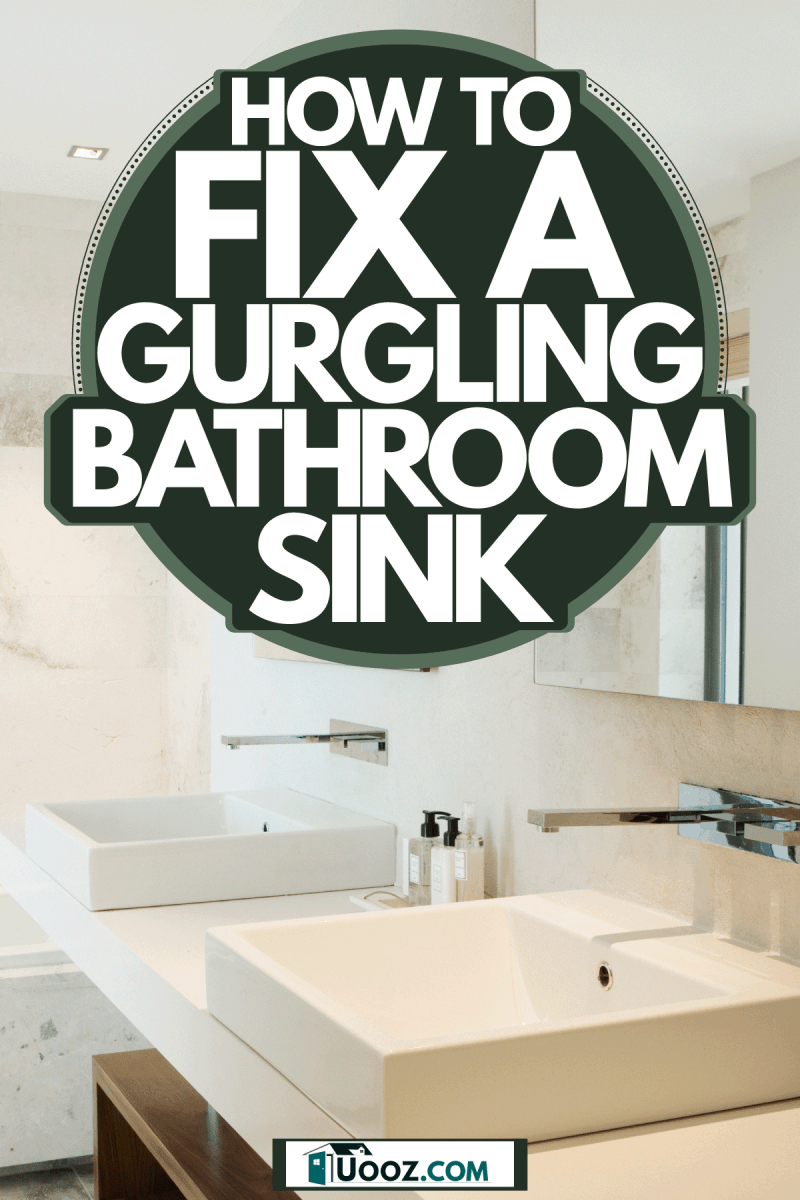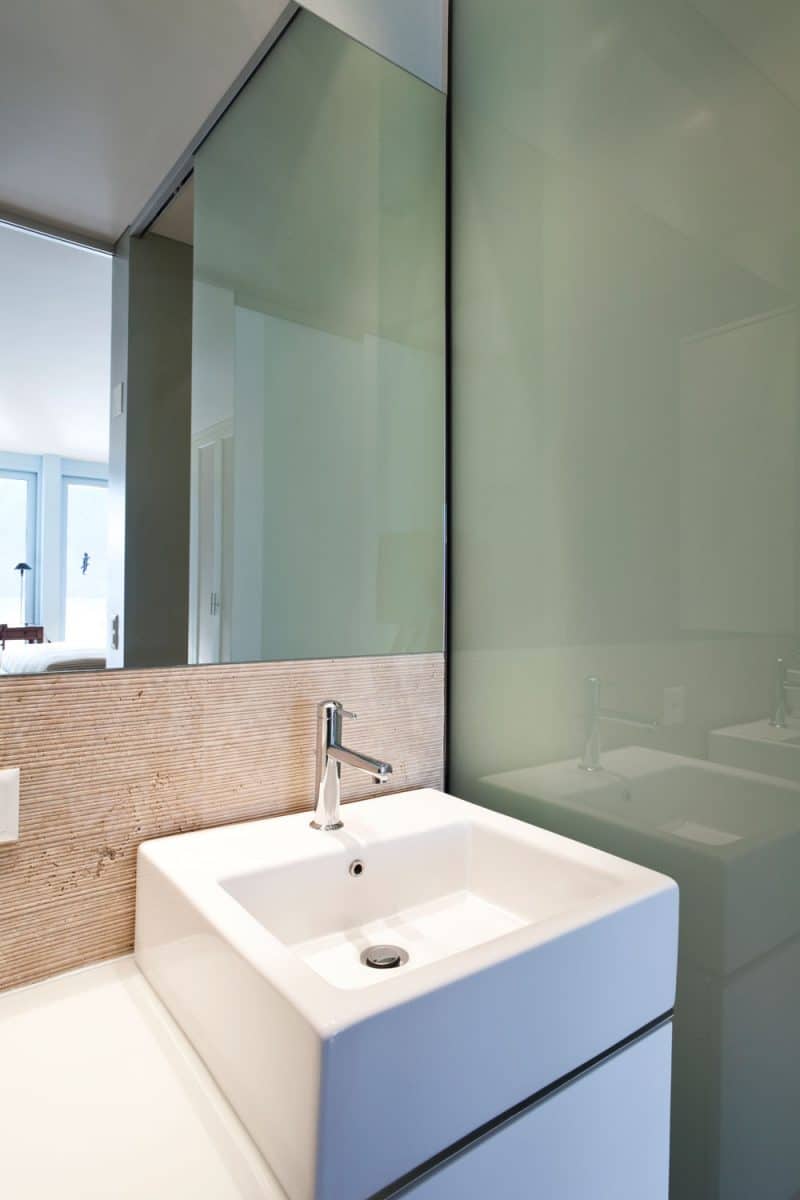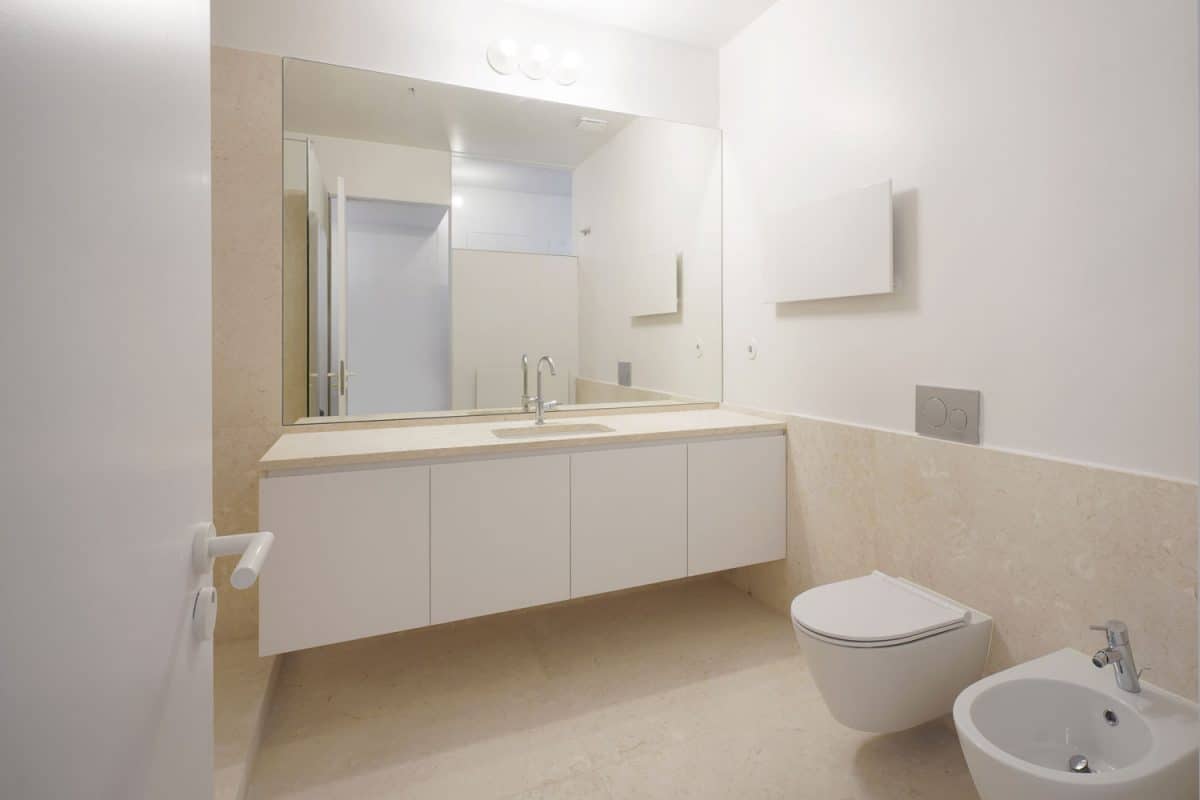A gurgling bathroom sink is not normal, nor should it be ignored. If your drain has begun making a gurgling sound or seems to drain slower than normal, chances are there is an issue or possible blockage in the drain. We have researched the best way to fix a gurgling sink, and in this post, we will share it with you.
A gurgling bathroom sink can be a nuisance in the truest form. Here are steps that you can take to fix this issue:
- Determine the root cause of the issue
- Do a drainage check
- Use a plunger
- Apply a drain cleaner
- Remove and clean the U-bend
It's important to note that a gurgling drain shouldn't be present if your sink is functioning properly. In fact, you shouldn't hear any sounds at all when the water drains or when the sink is empty. This type of noise happens when there are plumbing issues with the drain or vent line. Continue reading to learn about how to fix it.

Steps to Fix A Gurgling Sink
More often than not, a gurgling sink is the result of a pipe blockage within your sink's plumbing. Some blockages may be easier to fix than others. However, once you establish the main cause of the sound, you can go about troubleshooting it. Let's learn more about how to do it.
Things you'll need:
- Drain snake
- Baking soda
- Vinegar
- Bio-enzyme drain cleaner
- 2-gallon bucket or large bowl
- Wrench
- Drain snake or wire hanger
1. Determine the root cause of the issue
Several issues can cause your sink to began gurgling. Start by taking note of when you hear the sound. For example, do you hear it after the sink has been used? Also, have you recently made any changes to the sink? Are their odors coming from the sink?

Write down the times and days that you hear the noises and see if they coincide with any other actions with the sink. You'll also want to check other sinks in the home to see if they experience similar issues. If so, this may not be with your sink but with the entire home's plumbing.
2. Do a drainage check
Next, remove the stopper from the sink and grab a flashlight to check the sinkhole. Are there any objects lodged in the sink that are creating blockages? If so, this is the root cause of your issues. Next, grab a cup of water and slowly pour it down the drain to the drainage speed. Does the sink drain slowly? If so, chances are there is a blockage that you may not be able to see. The blockage is likely located in the pipes, and you will need to use a solvent or physical object to clear it.
3. Use a plunger
Oftentimes, you can also use a plunger to clear the drain. It's best to try the plunger first as it's less invasive and easiest to use. For this method, run the hot water in the sink for about 5 minutes. Then turn the water off and take your plunger and place it over the sinkhole. Press the plunger down vertically and then release it so that it will suck all the air out of the pipes.
Do this anywhere from three to five times to help clear the drain. If the blockage is dislodged, the water will drain freely. If you notice that the water is still moving slowly, proceed with a drain cleaner.
Read more details about this plunger on Amazon.
4. Apply a drain cleaner
There are several different clog removers and drain cleaners that you can use. You can even create your own solution using a few homemade ingredients if you prefer not to use hazardous chemicals. Let's take a look at both types of clog removers.
Bio-Enzyme Drain Cleaner
Bio-enzyme drain cleaners contain all-natural ingredients, which are typically found in foods such as apple cider vinegar and yogurt. These enzymes break down any biodegradable materials in the drain that may be causing the blockage. One good example of this is drain and grease trap cleaner. You can purchase this product online or at a local hardware store for less than ten dollars. You can also find a drain cleaner that is specifically formulated to remove hair and grease, as these are often the culprits behind most blockages.
When applying the drain cleaner, be sure to follow the directions on the back of the package. This typically includes running hot water in the sink after the drain cleaner has been allowed to sit for about 10 to 45 minutes. Be careful of mixing different drain cleaners as they may produce harmful fumes that can be dangerous to inhale and potentially dangerous for your pipes.
Check out this bio-enzyme drain cleaner on Amazon.
Homemade Baking Soda and Vinegar Drain Cleaner
Another quick way to clear drain blockages is to use a combination of baking soda and distilled white vinegar. To make this homemade drain clean, boil two to three cups of water on the stove. Next, take the boiling water and pour it directly into the drain. Make sure that the water is turned off before doing so.
Then, wait about 5 minutes and add a solution of one cup of distilled white vinegar and 4 tablespoons of baking soda into the drain. Allow this solution to sit in the drain for about 10 minutes, and then rinse the drain again with hot water. This should clear out any debris within the sink. Repeat once or twice.
5. Remove and clean the U-bend
If the other methods don't work, try removing the U-bend pipe from the sink. This is the U-shaped piped located beneath the sink and connected to the main water pipe. Chances are if you can't remove the blockage through the other methods, then it is probably located in the U-bend pipe itself. In this case, removing it and clearing the debris manually will help to clear it. To do this, take a two-gallon bucket or a large bowl and place it right beneath the pipe to catch any water. Next, take a monkey wrench and untwist the two nuts on both ends of the U-bend pipe by turning them counterclockwise or to the left.
Then grab a wire coat hanger or snake cleaner and run it through the pipe to eliminate any debris. Take a look at the pipe to see if you spot any obvious clogs. Once you have clear the debris, place the U-bend back in its position and twist the nuts back into place with your wrench. Then, turn on the sink to test the drainage flow and listen for any strange sounds. If you still hear gurgling sounds after this, you may want to contact a licensed plumber to help assist as you may have sewer issues.
Learn more about this snake cleaner set on Amazon.
Why is my bathroom sink gurgling?
There are a few different reasons why a bathroom sink may begin to gurgle. Let's take a look a look at the most common ones.
Drain Clogs
Drain clogs are the most common reason for gurgling noises in sinks; this includes both bathroom and kitchen sinks. These clogs can be caused by hairballs, excessive grease or product buildup, as well as mineral deposits. One of the best ways to prevent them is to install a catch screen on top of your drain, even if you have a cover.
It's also helpful to be mindful of the products that you use in your sink, as some can cause reoccurring issues with clogs--particularly if they contain oils. In which case, you may want to keep a drain cleaner on deck to prevent this.
Check out this drain cleaner on Amazon.
Vent Blockages
Another common occurrence is when the plumbing develops vent blockages. The sole purpose of these vents is to take in air so that water can flow freely through the pipes at a steady rate and with minimal air pressure. When these pipes have blockages, this can create increased air pressure in the sink, causing gurgling noises and drainage issues. In most cases, it's best to have a licensed plumbing professional deal with this issue.
Sewer line clogs
If you have clogs in your home's sewer line, these can also cause gurgling noises to develop in your sinks as well as your bathtubs. These noises will typically be accompanied by foul odors and water backups in the tub and sinks of the home. Keep in mind that this particular issue can be a health hazard to you and your family. In this case, it's best to contact a plumbing professional as soon as possible if you suspect this to be the issue.
P-Trap Issues
The P-trap (aka "U-bend" pipe) is a common area for sink drain clogs. If the P-trap is clogged with debris such as hair, grease, or grime, you'll definitely hear gurgling noises after running the sink--even if it's only for a few seconds. The best way to clear this issue is to remove the pipe itself and manually remove any clogging debris. You'll need a wrench and a bucket or large bowl to do this.
Check out this monkey wrench on Amazon.
Is a gurgling sink dangerous?

A gurgling sink is not typically dangerous, especially when the clog causing this sound is located in the P-trap or vent pipes. However, if there are sewer issues with your home, it can become dangerous as harmful gases can be emitted inside your home.
Do you need to vent a sink?
Yes. Any drain system will require a vent so that negative air pressure is reduced when the water is flowing through the sink. If not, the water will cause too much air pressure, the surrounding pipes will burst, and harmful odors can be released into the home from the drain trap.
Wrapping Things Up
We hope this post has helped you understand why a bathroom sink may begin to gurgle and how to fix this issue. Remember, if you tried troubleshooting the issue yourself to no avail, it's best to contact a licensed plumber to help mitigate the problem, especially if it's occurring in more than one sink in your home.
Before you go, be sure to check out some of our other posts:





